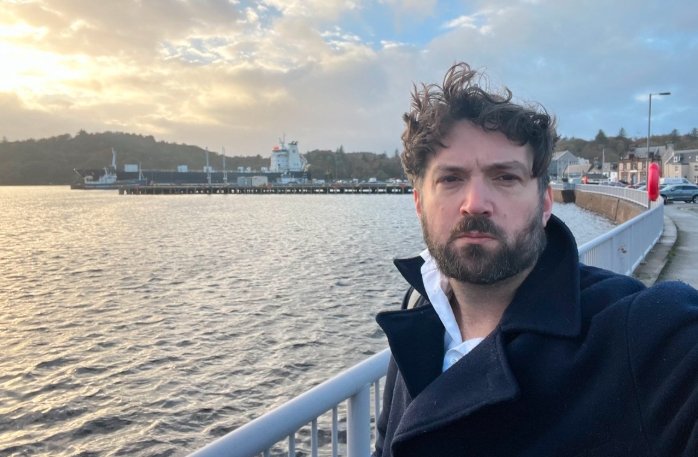Dominic Hinde, a journalist and sociologist, spent two years driving across Scotland to explore its energy past and future. In his new book and recent writings, he reveals stark issues like growing inequality, closed libraries, and widespread potholes that leave communities feeling isolated and forgotten.
Hinde’s travels highlight how Scotland, once powered by oil and coal, now grapples with a transition to green energy amid crumbling public services. From the Highlands to urban centers, he found a nation adrift, with basic needs unmet despite its resources.
Aberdeen’s Affluence Masks Harsh Realities
Hinde started his journey in Aberdeen, Scotland’s oil-rich city often called the energy capital of Europe. After decades of North Sea oil booms, one might expect thriving public spaces, but he found the opposite during a stormy day outside a shuttered library.
The council could not afford to keep the building open or staffed, forcing Hinde to work from his car in the cold wind. This scene captured the irony: a city flush with oil wealth yet unable to maintain simple community hubs. Recent data shows Aberdeen now ranks as Scotland’s pothole capital for 2025, with drivers facing the highest proportion of road defects in the country.
Such contrasts point to deeper problems. In 2025, Scotland’s poverty rates show slight improvements in child poverty compared to the rest of the UK, thanks to measures like the Scottish Child Payment. Yet, overall inequality persists, with 39 percent of people reporting discrimination in the past year, according to surveys on life in the UK.
Hinde notes that these issues echo US-style divides, where wealth gaps leave public services strained. His observations align with reports of carbon inequality, where private jet flights from Scottish airports hit over 8,000 in early 2025, highlighting elite excesses amid everyday hardships.

Library Closures Hit Communities Hard
Across Scotland, libraries have become symbols of neglected public life. Hinde encountered closed branches in multiple regions, from rural islands to city outskirts, underscoring a national trend of cutbacks.
Since 2008, nearly 100 public libraries have shut down permanently, equating to one in every eight. Staffing has dropped by 25 percent since 2014, with 42 closures in that period alone. In 2025, proposals to close over 60 percent of branches in some areas sparked outrage, though plans like those in Argyll and Bute were scrapped after local protests.
These losses affect education and social ties. Authors and charities warn that libraries are now “endangered,” vital for children and isolated residents. Hinde’s journey revealed how closures exacerbate feelings of disconnection, especially in places like Benbecula, vulnerable to rising seas yet short on community resources.
To illustrate the scale:
- Highlands and Islands: Over 20 libraries closed since 2010, impacting remote access to books and internet.
- Lowlands urban areas: Staffing cuts led to reduced hours, with Glasgow seeing multiple branches repurposed.
- North East (Aberdeen): Oil downturn contributed to budget squeezes, closing key sites despite economic history.
- Overall impact: One in eight Scots now lacks nearby library services, per recent charity reports.
Hinde argues this reflects broader fiscal pressures, including UK welfare policies like the two-child benefit limit, which the Scottish government seeks to mitigate but cannot fully override.
Potholes and Road Woes Signal Infrastructure Decay
Hinde’s old Honda Civic suffered suspension damage from endless potholes during his travels. From Highland backroads to urban streets, poor road conditions became a constant companion, mirroring Scotland’s infrastructure challenges.
In 2025, councils plan to fill seven million more potholes nationwide, with Scotland receiving part of a £1.6 billion fund. Yet, incidents rose 5.87 percent in the first half of the year, per AA data. Aberdeen tops the list as the pothole hotspot, surpassing Glasgow, while roadworks surged 28 percent since pre-pandemic levels.
Drivers pay the price, with repair claims to councils climbing amid higher insurance rates. Hinde links this to delayed maintenance, tied to energy transitions and budget strains. For instance, the Grangemouth refinery closure protests he witnessed highlight job losses fueling local despair.
A table of recent pothole statistics in key Scottish areas:
| Region | Pothole Incidents (Jan-Jul 2025) | Change from 2024 | Prevention Work Increase |
|---|---|---|---|
| Aberdeen | 1,200+ | +10% | 15% |
| Glasgow | 950 | -5% | 12% |
| Highlands | 800 | +8% | 18% |
| Edinburgh | 700 | +3% | 10% |
These figures, drawn from RAC and AA indexes, show uneven progress. Hinde’s drive to Fort William exemplified the frustration, with long stretches of battered roads slowing journeys and risking safety.
Energy Transition Fuels a Sense of Drift
Hinde’s book “Drifting North” ties these issues to Scotland’s energy history, from coal mines to wind farms. He visited sites like Dounreay, once a nuclear dream, now a relic, and North Lanarkshire’s coal belt, still scarred by industrial decline.
In 2025, Scotland marks progress with 4,000 employers paying the real Living Wage, boosting 72,000 workers. Yet, end-of-life poverty and land ownership battles persist, as new laws stir debate. Hinde, recovering from a 2019 accident, felt his personal turmoil mirror the nation’s uncertain shift from fossil fuels.
Recent events, like Oxfam’s call to act on carbon inequality, echo his findings. Private jets symbolize elite detachment, while communities face sea-level rises and service cuts. Hinde warns that without bold action, Scotland risks deeper divides.
His journey ends on a reflective note: Scotland helped build carbon capitalism and must now dismantle it. Ties to global trends, like UK welfare reforms, offer hope, but local inaction breeds isolation.
Readers, what have you noticed about inequality or services in your part of Scotland? Share your stories in the comments below and spread the word by sharing this article to spark wider discussion.


















